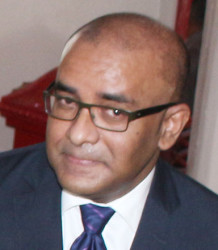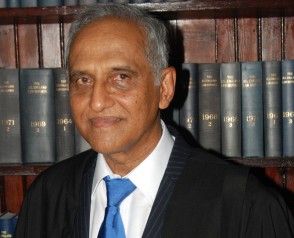Justice Navindra Singh yesterday ruled that the private criminal charge against former president Bharrat Jagdeo, filed in April this year by attorney Christopher Ram, did not disclose an offence and therefore the magistrate who heard the matter had no jurisdiction.
The judge made abso-lute the writ of prohibition that had been issued by Justice William Ramlal on June 26th, 2015 against Magistrate Charlyn Artiga hearing the matter.
Following Ram’s complaint, Jagdeo had been charged with making racially divisive statements in contravention of Section 139 D of The Represen-tation of the People Act. He was accused of making the statements at a public meeting held at Babu John, Corentyne on March 8th, which could have resulted in racial or ethnic hatred among the people. He was particularly upbraided over the use of the word “coolie.”
On his first appearance, Jagdeo, through his attorneys, had submitted to Magistrate Artiga, that the particulars of offence articulated in the information, did not disclose the offence charged and therefore the court did not have jurisdiction to enquire into the charge.

The magistrate had, however, overruled the submissions. On June 26th, one of Jagdeo’s attorneys, Mursaline Bacchus, filed a notice of motion in the High Court to prevent the magistrate proceeding with the hearing of the matter on the grounds that she had no jurisdiction to do so along with a notice of motion stating that the charge was bad in law and should be dismissed.
On the issue of jurisdiction, Justice Singh, in his decision yesterday, reasoned that if in fact the particulars of offence stated in the information did not support the offence charged, then the magistrate would not have jurisdiction to conduct a preliminary inquiry (PI) into the charge.
Citing the case of Raja Anand v State of U.P. AIR 1967 SC 1081, the judge noted that “it is well settled that a court cannot by a wrong decision regarding a jurisdictional fact confer upon itself jurisdiction which it does not otherwise possess. Further, the court cannot confer upon itself jurisdiction that it does not possess by erroneously presuming the existence of a jurisdictional fact.”
Justice Singh further reasoned that if it is that the applicant is saying that the magistrate has no jurisdiction to conduct a PI it can make no sense legally (or economically) to wait for the completion of the PI and depending on the magistrate’s decision, then make this application.
“If the information does not disclose an offence, then it is a nullity in law and any preliminary inquiry conducted by the magistrate will be without jurisdiction,” Justice Singh asserted.
After establishing that his court had the authority to review the magistrate’s ruling, Justice Singh
then examined the section under which Jagdeo had been charged to determine what constituted the elements of the crime he was charged with, and what Ram needed to prove to the court, in order to yield a valid conviction.
Justice Singh noted that Section 139 D (1) (a) of The Representation of the People Act Cap1:03 of the Laws of Guyana, relevant to this motion, states: “any person who makes or publishes any statement which results or can result in racial or ethnic hatred among the people shall be liable on conviction….”
The judge said that the elements contained in that section are: “the making or publishing of a statement which the applicant did make or publish;” and “that such statements did result or could have resulted in a racial or ethnic hatred among the people.”

Relying on case law to substantiate the court’s position regarding those elements, Justice Singh also examined the terms racial hatred, race, ethnicity and hatred.
Justice Singh said that in local parlance, the word “coolie” is understood to refer to persons of East Indian descent, “more of an ethnic than a racial classification.” Because of the blurring of lines of distinction between race and ethnicity, he said the elements of ethnic hatred and racial hatred could be considered together.
The judge noted that the first statement alleged to have been made by Jagdeo in the particulars of the offence was that “The Opposition consistently shout about racism of the P.P.P. but they practice racism.”
Justice Singh said that without any further particulars, a race or ethnicity could not be assigned to “The Opposition” or the “P.P.P”
As stated in the particulars of the offence, the Judge referred to the second statement alleged to have been made by Jagdeo that “The Opposition beat drums at six in the morning and say let us throw out these coolie people.”
The judge stated that without any further particulars, race or ethnicity could not be attributed to “The Opposition” or a race or ethnicity different from “coolie people.”
The judge then posited that it was clear that the particulars of the offence did not disclose an offence and that there could be no resulting conviction since no criminal offence was disclosed.
“The applicant in making the statements, for those statements to constitute an offence as charged in the information, must be shown to be calling for, supporting or encouraging the hatred of one group by another on race or ethnicity,” the judge found.
“The court does not find that the particulars of offence have disclose such facts,” he added.
Justice Singh noted further that this is an essential, preliminary or collateral fact which is a condition precedent to the assumption of jurisdiction by a subordinate court that is missing and, as previously stated, the court cannot by a wrong decision, regarding a jurisdictional fact confer upon itself jurisdiction which it does not otherwise possess.
The judge explained that this is a fundamental defect which cannot be remedied, since to amend the particulars in this information to remedy that defect would be to allow a charge to be disclosed where there was previously no charge and that is not allowed.
Citing the cases of R v Gray [1965] 8 WIR 270 and Harper v Prescod [1967] 11 WIR 183, the judge said that an amendment does not authorise the transformation of an information which on the face of it discloses no offence into one disclosing an offence.
Justice Singh reasoned that, “the applicant (Jagdeo) was merely reporting the actions of other persons and therefore even if the statements disclosed in the particulars of offence were capable of resulting in racial or ethnic hatred, it is not the applicant who would have been liable of the offence.”
In his ruling, the judge also raised the issue of freedom of expression.
“The Court has used this opportunity to remind the legislature (of) the need to safeguard the freedom of expression as recognised under international law, however, for the reasons discussed above, that is, that the statements recited in the Particulars of Offence do not disclose any offence, the issue of intent and whether it is an element that has to (be) proven in proving this offence is not an issue in this case,” the Judge said.
The Attorney General’s Chambers was represented by attorneys Prithima Kissoon and Judy Stuart for the respondent, Magistrate Artiga.
There was no order as to costs as the matter was a private criminal charge.




